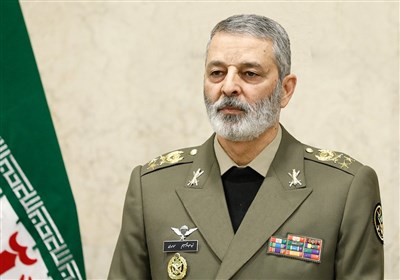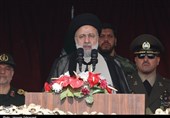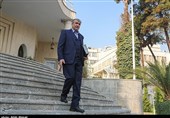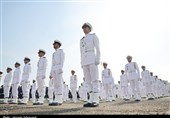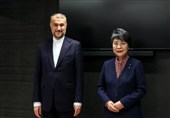Manama Following Riyadh’s Footsteps by Repressing Peaceful Protests: British Author
TEHRAN (Tasnim) – A top Britain-based academic and author said the Bahraini regime’s brutal crackdown on peaceful protesters and opposition leaders is in part due to the Al Khalifa being emboldened by Al Saud’s “increasing repression” of its people.
“The human rights situation in Bahrain appears to have markedly declined since 2011, and especially since 2015, with the arrests of key opposition leaders and the dismantling of leading opposition parties,” Dr. Christopher Davidson said in an interview with the Tasnim News Agency.
Dr. Davidson is a policy expert on the Arab monarchies in the Persian Gulf region and specializes in the field of Middle Eastern and Islamic Studies. Having lived and worked in Abu Dhabi, Dubai, Sharjah, and Beirut, Dr. Davidson has an extensive knowledge of this region of the world. Because of his area of specialization, he has provided consultations and reports for a variety of institutions and organizations worldwide.
He has published six single-authored books, two edited volumes, and a number of scholarly journal articles and chapters in other edited collections. His 2013 book, After the Sheikhs (New York: Oxford University Press), was translated into both Arabic and Farsi and was reviewed by the Guardian, the Independent, and the Economist.
Dr. Davidson has also made various appearances in the media to provide commentary on his area of expertise. His television and radio credits include the BBC World Service, BBC Radio 4, NBC, WNYC, NPR, American Public Radio, The Discovery Channel, and Abu Dhabi TV. His newspaper and magazine citations include The Financial Times, The Daily Telegraph, The New York Times, US News, The Times Higher Educational Supplement, Fortune Magazine, Forbes Magazine, The New Statesman, Prospect Magazine, Newsweek, City Journal, and Al-Arabiya. His opinion editorials have appeared in The New Statesman, The National (Abu Dhabi), The Daily Star (Beirut), and Daily News (Egypt).
Following is the full text of Tasnim's interview with Dr. Davidson:
Tasnim: As you know, Bahrain, which is home to the US Navy's massive 5th Fleet, has been witnessing peaceful protests against the ruling Al Khalifa regime on a daily basis since early 2011. This is while, scores of Bahrainis have been killed and hundreds of others injured and arrested in the ongoing crackdown on the peaceful demonstrations. Given that you have made detailed studies and published some articles and books about the kingdom, how do you see the human rights situation in the Arab country?
Davidson: The human rights situation in Bahrain appears to have markedly declined since 2011, and especially since 2015, with the arrests of key opposition leaders and the dismantling of leading opposition parties. In part, this is due to the Bahraini regime being emboldened by increasing repression and sectarianism in its patron state, Saudi Arabia, next door, which of course went as far as executing Nimr al-Nimr, and seizing hundreds of other political prisoners over the past couple of years. The Bahraini regime is also emboldened by the US' lack of options with regard to the Fifth fleet, as US spokesmen have already revealed that there is no suitable alternative base in the region.
Tasnim: In a bid to silence the voices of dissent, the Manama regime announced on June 20 that it had revoked the citizenship of Sheikh Isa Qassim, the spiritual leader of Bahrain's Shiite majority. The regime later said it would put the senior cleric on trial on charges of “illegal fund collections, money laundering and helping terrorism”. Sheikh Qassim’s planned trials were adjourned after the prominent cleric did not appear in court. In the meantime, a sit-in that supporters of Sheikh Qassim have staged in front of his house in Diraz to protect him against the regime forces has remained in place for four straight months. What do you think about the future of such sit-ins in Bahrain? Is there any possibility that the regime softens its position on the prominent leader?
Davidson: It is unlikely, for the above reasons, that Bahrain will soften its position on such prominent opposition leaders. The Bahraini monarchy has to be seen as taking a 'hard line' on such opponents, not only to try to head off any future street protests as the economic situation continues to worsen, but also to be seen as being tough on the Shia. As we know, there are sympathies with the Bahraini security services for avowedly anti-Shia, sectarian groups in the region, including the Daesh (ISIS or ISIL).
Tasnim: It has been five years since troops from Saudi Arabia were deployed to Bahrain to assist in the Manama regime’s crackdown on the peaceful protesters. What is the reason behind such assistance? In your opinion, what geopolitical goals is Riyadh pursuing by the military intervention in the tiny Persian Gulf country?
Davidson: At the time, in 2011, Saudi Arabia had to ensure that no Arab monarchy fell to a popular protest movement. So as well as economic aid to Jordan, Morocco, etc., it also required a military intervention in Bahrain, as it looked at that moment as though the monarchy was slipping from power. A popular revolution would have blown apart the myth that Arab monarchies are somehow invincible, compared to the Arab republics.
Tasnim: Dr. Davidson, you have published several books on Middle East issues, including “After the Sheikhs” (New York: Oxford University Press), which was translated into both Arabic and Farsi. Your new book, Shadow Wars: The Secret Struggle for the Middle East, which is based on four years of archival work, has also been published earlier in October. Would you please introduce the books and explain what motivated you to write them?
Davidson: After the Sheikhs was intended to provoke mainstream, meaningful discussion about the oil-dependent Arab monarchies, and to perhaps kick-start an academic debate about the prospects of real change, rather than simply reproducing stale material in support of the status quo. The book was divided into outlining the rising internal and external pressures faced by these states, and demonstrating how these two groups of pressures were soon likely to combine, leading to significant and unavoidable changes to the nature of the social contracts or 'ruling bargains' that underpin these sort of monarchies.
Shadow Wars draws on recently declassified documents, leaked correspondences, interviews, and court subpoenaed files. The aim has been to tackle an entire 'regime of knowledge' that largely depicts the Western postcolonial involvement in Arab world as being benign. Moving beyond the obvious examples of the 2003 Iraq invasion, it aims to show how an elaborate network of proxies and clients (including the Arab monarchies in the Persian Gulf region and supplicant republican dictators) have helped ensure access to cheap resources and cheap labor for foreign companies, and (especially since 2011) have been co-opted to remove threats to what has essentially been a Western constructed status quo.
More broadly, the book used comparative historical analysis to demonstrate that fingerprints of earlier counter-revolutions littered across the twentieth century can be found all over the Arab Spring counter-revolutions today. These include the Anglo-American actions in Russia (post revolution), Malaya, Kenya, Guatemala, Iran (1953), Syria and Iraq (1950s-60s), Cuba, Chile, Nicaragua (a great example), the Afghan jihad against the progressive People's Democratic Party, the insertion of jihadists into the Balkans to help with the fight against the Serbian republic, etc. In terms of broader aims for the book: if one wants the MidEast to recover, one must identify the real root causes of its afflictions, and if one wants the essentially peace-promoting Islamic faith to be saved, one must identify how it has been repeatedly co-opted by external powers that have manipulated local, reactionary allies, so as to generate extremist cults capable of stifling (and fighting) more progressive, nationalist, or even democratic forces that could nationalize economic assets or attempt to chart foreign policies that do not involve supplication to the Western powers or their regional allies.

